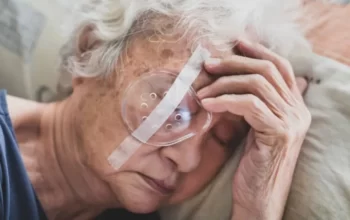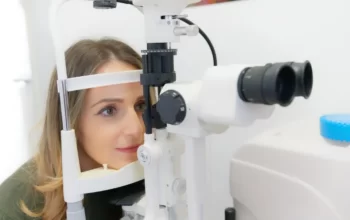
While the following list may serve as a resource for you to learn more about these ailments, it should not be used in place of a diagnosis from a healthcare professional. The symptoms and signs you are exhibiting could also be caused by a wide range of other medical conditions.
Dehydration, which can have a variety of causes, can cause symptoms like lightheadedness, headaches, dry eyes, and dizziness. These symptoms may have additional causes as well. All of your symptoms, as well as what causes or relieves them, should be noted down. If you are worried, ask a doctor for advice.
Dizziness and Balance Problems Related to Vision
Maintaining balance is a complex process that is controlled by three different systems in the body:
- The vestibular system is mainly located in the inner ear and is responsible for providing the brain with information about head position, spatial orientation, and motion
- The visual system provides input from your eyes to your brain, and is the dominant system providing cues for maintaining balance and preventing dizziness
- Proprioceptors in the legs and feet provide the body with a stable platform as well as information on movement and motion
How Can Impaired Vision Cause Dizziness and a Balance Disorder?
It’s common advice to close your eyes if you’ve ever felt seasick or motion sick. By doing this, the visual system’s influence is reduced, which can lessen nausea and dizziness. Dizziness and balance issues can be brought on by any disruption in the eye-brain connection or the visual system.
Dizziness and Vision
Dizziness can happen when there is a negative impact on the visual system, such as after a concussion, stroke, or other traumatic brain injuries (TBI).
The most common causes of vision-related dizziness include:
- TBI
- Eyestrain
- Incorrect eyeglass or contact lens prescriptions
- Binocular vision disorder (eye misalignment)
Dizziness is frequently brought on by issues with binocular vision. Because of the conflicting signals the eyes receive from the brain when they are not aligned, they may stray from their proper position. As a result, the eyes work hard to piece the images back together in order to have a coherent and distinct understanding of their surroundings. The additional strain on the eye muscles may cause them to tremble, which may make you feel faint or dizzy.
Dizziness-causing eye misalignment can be so subtle that it is frequently missed during routine eye exams. For this reason, it is crucial that anyone experiencing vertigo or balance issues undergo a thorough functional visual assessment with Dr. Tedra Kindopp to rule out visual dysfunction as the origin of the symptoms.
Balance Problems and Vision
A balance disorder can cause a person to feel as though they are moving while they are still. Additionally, they might have trouble walking straight, especially if they suddenly stand up from a seated or reclined position.
Having proper balance can be difficult if you have vision issues. People who have vision problems may experience eyestrain, headaches, and balance problems as a result of the eye muscles having to work harder to make up for the loss of visual clarity.
The most common causes of vision-related balance problems include:
- Blurry or double vision
- Binocular Vision Dysfunction (eye teaming)
- Concussion
- Hemianopsia (blindness in one half of the visual field)
- Nystagmus (involuntary and repetitive eye movements)
- Spatial Disorientation
- Vertigo
- Visual Midline Shift Syndrome
Why Waking Up With Dry and Itchy Eyes
Aging
Dry, itchy eyes can occur in anyone. But as you get older, the condition becomes more typical. Due to decreased tear production, older patients are more vulnerable to morning dry eyes.
There is a solution even though it is not possible to repair your tear production. Consult your optometrist or ophthalmologist about the use of artificial tears. Your eyes may receive additional lubrication if you use artificial tears on a regular basis.
Applying artificial tears to your eyes will help you stop the daily dryness.
Your eyes may feel heavy and dry at first if you have chronic dry eyes. You might also find it difficult to concentrate on some tasks. Make a note if you experience:
- Clouded vision
- Night driving problems
- Discomfort wearing contacts
- Sensitivity to light
- Burning, itching, or stinging
- Red and sore eyelids
- Mucus secreting from the eye
If you experience any of these symptoms, tell your eye doctor. They will also conduct an eye exam to look at your eye and tear ducts in addition to asking you questions about your medical history. In addition, your doctor will evaluate your cornea and the condition of your tear film.
Patients who suffer from dry eyes and itchy eyes frequently have abnormal tear quality. Your ophthalmologist or optometrist can decide the best course of treatment for you by looking at your symptoms.
Medication
Your tears are made of mucus, water, and oil. Some medications can decrease your mucus production, which results in dry eyes. These medications include:
- Beta-blockers
- Diuretics
- Antidepressants
- Antihistamines
Consult your doctor if the medication you’re taking is causing dry, itchy eyes. Find out if there is a different medication you can use. To keep them hydrated, you may also need to use artificial tears in addition to your medication.
When determining a course of treatment, your doctor will consider four possibilities:
- Increasing tears
- Maintaining tears
- Triggering tear production
- Healing inflammation
The severity of your condition frequently determines the course of treatment. For instance, if your symptoms are minor, you only need artificial tears.
You might need to have your tear ducts blocked if that course of treatment doesn’t work. Your tears will not drain if you do this.
The production of tears can be induced with inserts and prescription eye drops. Also helpful are omega-3 fatty acids.
Menopause
Over 16 million Americans suffer from dry eye disease overall. Women who suffer from dry eyes are twice as common as men.
Your eyes may become dry due to hormones. Some pregnant women or those taking birth control pills experience dry eyes when they first wake up. Others report having dry eyes in the morning as a result of the menopausal hormone changes.
Tear duct opening is triggered by hormones. A decrease in the amount of tears you produce can result from hormonal imbalance.
It’s significant to note that hormone replacement therapy doesn’t appear to make dry eyes better. To lessen the itchiness and dryness, talk to your doctor about using lubricating eye drops.
Computer Use
Dry and itchy eyes can also result from spending too much time in front of a computer. A lot of us, sadly, spend our entire workday in front of a computer. Computer use can result in eyestrain and tension headaches in addition to causing your eyes to dry out.
Blinking is less frequent in those who spend their days in front of a computer. Tears dry up more quickly as a result of this.
Try to blink more frequently if you sit in front of a computer all day. Your eyes will remain lubricated if you blink frequently to avoid dryness.
A few minutes at a time should be spent looking away from your computer. Every 20 minutes, look away from the computer and blink to moisten your eyes.
Use artificial tears in addition if your eyes are still dry.
Laser Surgery
Cutting some of the cornea’s nerves occurs during laser vision correction surgery. The eyes don’t cry as much because of the incision. As a result, some people who choose laser surgery occasionally experience dry eyes.
After laser eye surgery, dry eyes are typically a temporary problem. In a few days or weeks, the issue should be fixed on its own. To keep your eyes moist while waiting, use lubricating eye drops.
Dry eyes can also result from long-term contact lens use. Sometimes the lenses prevent oxygen from reaching the cornea, which hinders tear production.
Consult your doctor if your eyes aren’t sufficiently lubricated. You may be advised to wear glasses or try a different brand of contacts. The availability of moisture-retaining contact lenses has increased.

Vitamin a Deficiency
Your eyes will remain happy and healthy with the aid of vitamin A. Dry eyes and vision impairments may result from a vitamin A deficiency in your diet.
Try eating foods that are rich in vitamin A, including:
- Eggs
- Fish
- Carrots
- Spinach
- Broccoli
- Peppers
A blood test can be used to determine whether you are vitamin A deficient.
Wind Exposure
The tears in your eyes may evaporate in colder weather and strong winds. Make sure you have a pair of goggles on if you intend to go skiing. Use lubricating eye drops in the interim to protect your eyes.
Dry eyes and itchy eyes are also caused by mild dehydration and low humidity levels.
Your eyes could become dry from the air. Check your home’s humidity levels carefully. You might also want to reposition your desk or bed to prevent air from blowing directly into your eyes.
To prevent your tears from evaporating, a humidifier can also moisten the air.
Dehydration before bed can also result in dry eyes the next day. Dehydration can also lead to:
- Dark urine
- A lack of energy
- Dizziness
- A rapid heartbeat
Consistently consume eight to ten glasses of water per day. Also, give your eyes a break. Make sure you’re sleeping enough each night—roughly seven to eight hours.
Sjögren’s Syndrome
Sjögren’s syndrome is an autoimmune condition that causes white blood cells to attack your salivary and tear glands. Your body may produce fewer tears as a result of the condition.
Typically, both over-the-counter and prescription lubricating eye drops are used to treat Sjögren’s syndrome. However, a steroid eye drop may also be recommended by your doctor.
Your doctor might advise surgery if using the eye drops doesn’t help your dry, itchy eyes.
Your tear ducts will receive silicone plugs during this kind of surgery. In order to keep your eyes moist, these plugs will aid in preserving your tears.
Autoimmune Diseases
You may experience dry eyes when you wake up in the morning due to other autoimmune diseases as well. These include:
- Arthritis
- Lupus
- Diabetes
Poor tear production may result from these circumstances. You might also experience:
- Joint pain
- Fatigue
- Fever
A doctor should be consulted for a proper diagnosis if you experience these symptoms. Additionally, you might experience extreme thirst and frequent urination, which are typically signs of diabetes.
Your dry eye symptoms will improve once the underlying autoimmune disease has been identified and treated.
Most autoimmune diseases are treated with an immunosuppressant medication. A corticosteroid may also be necessary. Managing your blood sugar levels through a healthier diet is part of the treatment for diabetes.
Blepharitis
You develop a condition known as blepharitis when the tiny oil glands in your inner eyelids become inflamed and clogged. Blepharitis cannot be cured.
You might also notice oily flakes around your eyelashes in addition to dry, itchy eyes.
There is no known cure, but it can help lessen your inflammation. Make an effort to cover your closed eyes with a warm compress. Give the compress some time to work.
Then, use baby shampoo to clean your eyelids.
Use artificial tears to lessen redness, dryness, and irritation while your inflammation is still present.
Visit your doctor if your symptoms don’t disappear. They might advise a course of treatment that calls for using antibiotic eye drops. Try some of these organic treatments for dry eyes as well.
Allergies
You may awaken with dry eyes if you have allergies. Your eyes may appear watery, red, and scratchy.
You can lessen your allergies by taking an oral antihistamine. However, some medicines may worsen your dry eye symptoms. Make an appointment with your doctor if over-the-counter allergy medications don’t relieve your symptoms.
For your dry eyes, they might recommend antihistamine eye drops.
Treatment for Vision-Related Dizziness and Balance Problems
A neuro-optometric rehabilitation therapist can help if a visual issue is the cause of dizziness and balance issues if it is determined that the issue is visual in nature.
What is Neuro-Optometric Rehabilitation Therapy?
At The Eye Studio, we offer neuro-optometric rehabilitation, which is a specialized course of weekly therapy sessions to enhance, hone, or develop new or lost visual skills. This specialized treatment uses a number of methods and exercises to enhance your visual perception and processing, strengthening the link between the eye and the brain.
You will receive a thorough eye exam prior to the start of the neuro-optometric rehabilitation program to evaluate your visual abilities and identify any visual dysfunction that may be present.
We will recommend a specific treatment plan and take care of the condition once the cause of it has been found. Numerous times, vestibular therapy will also be suggested in addition to visual therapy. The goal of vestibular therapy, a unique form of physical therapy, is to correct balance in order to alleviate dizziness symptoms.
When Should You Seek Treatment?
Even a minor TBI should prompt a neuro-optometrist evaluation as soon as possible. The likelihood of success increases with the timing of treatment. That said, there is still hope for patients who suffer from symptoms caused by a head injury that occured months or even years prior; we can still assess your situation a
nd develop a course of treatment to help you recover now.
How Long Does Treatment Take?
No two patients are alike — if you’ve seen one head injury, you’ve seen one head injury. Dizziness, balance issues, or vision issues vary in severity from person to person. Some patients might only need a few weeks of treatment, while others might need something more extensive. The good news is that neuro-optometric rehabilitation therapy generally results in long-lasting improvements.
FAQs
Can Dry Eyes Cause Balance Problems
Yes, any type of eye strain or issue can cause vertigo (as well as other neurological symptoms). This is due to the fact that dizziness can result from any problem between the eyes and the brain.
How to Treat Dizzy and Trouble Focusing Eyes
Visual vertigo is defined as a disorder characterized by symptoms that include dizziness, unsteadiness, and disorientation, caused by visual triggers. People with BVD experience visual vertigo because of their misaligned eyes, though there are other causes of visual vertigo as well.
Can Dizziness Be a Sign of Eye Problems?
Yes, any type of eye strain or issue can cause vertigo (as well as other neurological symptoms). This is due to the fact that dizziness can be caused by any problem with the eyes or brain.
Can Dry Eyes Cause Headaches and Dizziness
Dry eyes can cause differences in the length, symptoms, or severity of headaches experienced by an individual. Changes in the eyes, such as symptoms of dry eye, may be the cause of headaches in people who are prone to them. Sensitivity to light, eye pain, and swelling are among the symptoms that both headaches and dry eyes have in common.
Can Eye Drops Cause Vertigo
Some patients may experience dizziness and visual disturbances after using dorzolamide eye drops.



